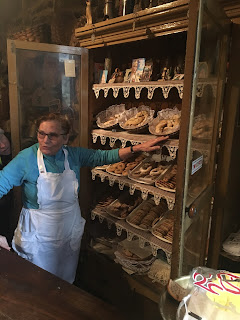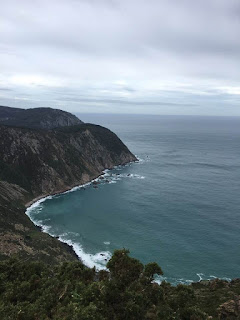Hola Familias!!
In addition to all the wonderful quotes about Galicia, I thought it would be a good idea for some of our blog posts to come straight from the source! So, live and through an internet connection, Caroline Schneider writing to you from Castilla y Leon! I had this idea after reading a blog from LITA's Summer Program where the students wrote about what they were doing. Today was a super special day, and I felt like it would be the perfect opportunity to share my thoughts, and for a small
descanso from Sra. Rocamora's adjectives (but we love you)! However, brace yourselves. I have even more adjectives.
After waking up this morning, we took a short trip to Mucientes, another town outside the big city of Valladolid. There we met Paco Diez, esteemed musician and Sephardic music expert. Paco has a museum dedicated to Sephardic musical instruments, and we spent the morning walking through it with him. We were all a bit tired from the lengthy travel day before, but Paco captivated us with a brief history of Spain before 1492, or
mil cuatrocientos noventa y dos. All of our guides and teachers have stressed the importance of this year, not only because of the discovery of the New World, but also the marriage of Isabella y Fernando to form what we know today as Espana. Additionally, this year was the start of the Spanish Inquisition, a time of persecution of all non-Catholics. Since we have learned lots about this momentous period in Spanish History, it was refreshing to hear about Sephardic Jewish history and how religious groups mixed well at one point in time. We will learn much more about this when we visit Toledo, a city where at one time Jews, Christians, and Muslims all lived together in peace and reached a cultural acme. When Paco began describing the coexisting of the three major monotheistic religions, Sra. Rocamora mentioned Peace by Piece, a wonderful organization in which Weber participates. Rosa and I described the program in more detail for Paco, and it was interesting how the past in Spain mirrors what we strive to do with Peace by Piece.
One reason that Paco Diez is such an incredible musician is because he can literally play every instrument ever to exist. At one point, he had us close our eyes, and our ears filled with a sonorous tune. Once we opened our eyes, we saw that Paco was blowing into a stick that could not have been more than a centimeter in circumference. Paco walked us through all the different instrument groups from strings to percussion, playing every instrument with ease, and violently placing them back into their cases. He played at least 30 different instruments one right after the other, leaving us all in disbelief. Paco also talked to us about how percussion is in everything we do: there is a rhythm in every step and every heartbeat. The last instrument he showed us was the
gaitas or bagpipes, and he played the Hatikva and we all sang along. If only it were Friday...
After the museum, a new guide Lucia met us so we could venture into the earth. That's the sci-fi way of saying that we went to an underground wine cellar, which is called a
bodega here. There, we got to learn about the preparation and fermentation of the grapes, and the importance of wine as a major staple in Spanish culture. Jordan also got us some pastries that were
muy deliciosos. I had a chocolate covered elephant ear cookie--a palmier--which is making me drool just thinking about it (just
para que sepas, I am writing this before dinner y
tengo mucho hambre).
We were invited into the private
bodega of Paco Diez after our wine tour, where we ate lunch and had our own personal jam session. Paco and his wife cooked us some lovely paella and chicken that was so good I ate the dark meat (and I only like white meat chicken). But our jam session was the main reason that I wanted to write today's blog post specifically. It was such a beautiful moment that brought a few of us to tears. We sang songs in Spanish and English, and we got to hear the lovely voices of our counterparts. We started with a rendition of
Adio Kerida, the Ladino song we learned before our departure.
Side Note: Last night after dinner, all of us girls were getting ready for bed when we heard some laughter outside our window. The boys, who are staying in a different house, were serenading us! They sang their Ladino hearts out and braved the cold winds to make sure we went to bed happy. Actually, it might have been for a grade.
Paco taught us some Sephardic Spanish songs and sang a few of his own, but the real magic came when we got out some song books. What really got the ball rolling was Sra. Rocamora's solo of Besame Mucho, which left us all SHOOK (teen slang for "we were all pleasantly surprised and loved it"). Daniel S. joined Senora up front to sing Beatles classics "Yesterday" and "Imagine" and everyone joined in. Paul went up front too for "Hotel California," followed by Jordan singing an original song and Daniel S. singing "Bones" by Lewis Watson. "Blowing in the Wind" was followed by a "La Bamba/Twist and Shout" remix. With help from Chloe and Sta. Bowers, Leonard Cohen's "Halleluyah" reminded many people of summer camp. May's insanely amazing and energetic version of "I Will Survive" made us all long for voices like hers, but then the boys took over for "Piano Man." We finished with a second round of
Adio Kerida, and Paco shared some inspirational words. He said that "la musica no tiene fronteras"--music has no borders. He also talked to us about the importance of understanding other cultures while maintaining our own. I speak for everybody when I say that there is a lighter energy among everyone now, and we have music flowing in our blood tonight.
There are many photos and videos on the photo stream for all to enjoy!
Thanks for reading--I know I wrote a lot. We miss you all a lot but we are having a ton of fun at the same time.
Hasta luego!
P.S. Picture this: a dimly lit, toasty room with two candelabras. At one point during a slow song, a paella-filled Mr. White (Barrigon) decided to "rest his eyes" - a mistake on his part. Paco made sure to sing extra close, and he woke in a startle. It was the highlight of the day.
Caroline Schneider













